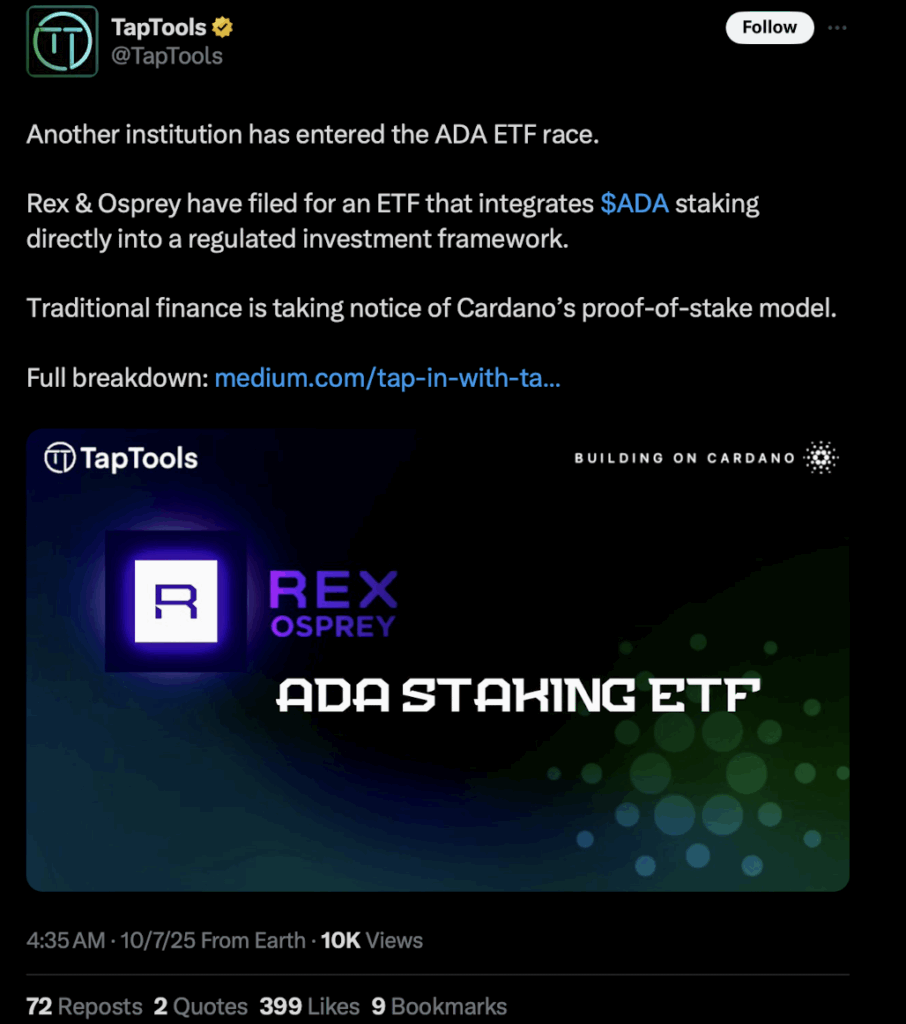- Rex & Osprey filed 21 ETF applications, including a Cardano staking ETF.
- The ETF offers 1:1 ADA exposure with staking rewards distributed to shareholders.
- Institutional adoption signals Cardano’s growing legitimacy in regulated finance.
Earlier this month, Rex & Osprey—two firms with a track record in digital asset products—stepped into the spotlight again with a fresh wave of ETF applications to the U.S. SEC. Out of the 21 filings, one stood out: the REX Osprey ADA Staking ETF. This particular fund aims to wrap Cardano’s proof-of-stake mechanism into a fully regulated investment structure, giving traditional investors exposure to ADA rewards without the headaches of staking on their own.
The timing couldn’t be more interesting. Institutional interest in staking has been building steadily since Ethereum and Solana launched their own staking-focused ETFs. By jumping into the ADA ETF race, Rex & Osprey are effectively putting Cardano on the same playing field as other networks already enjoying institutional attention. According to TapTools, the move highlights how traditional finance is getting more comfortable with blockchain-based yield strategies—something that would’ve sounded far-fetched a few years ago.
How the ADA ETF is Built
The REX Osprey ADA Staking ETF is set to run under the ETF Opportunities Trust, managed by REX Advisers LLC. The idea is simple enough: maintain full ADA exposure on a 1:1 basis, while paying out staking rewards directly to shareholders. For investors, it means earning on-chain yields without having to deal with validator nodes, delegations, or custody—basically, a bridge between DeFi and Wall Street.
The structure itself is layered. ADA exposure comes not only from direct holdings but also through ADA-linked exchange-traded products managed by 21Shares, CoinShares, Valour, and Virtune. To stay compliant and tax-efficient, a Cayman Islands subsidiary—REX-Osprey ADA + Staking (Cayman) Portfolio S.P.—has been included in the design. Custodians will manage staking operations, delegating ADA to validators and collecting rewards. Liquidity rules are tight too: no more than 15% of the fund can sit in illiquid assets. Trading will take place on the Cboe BZX Exchange, with redemptions settled in cash.

Why Institutions Are Paying Attention
Rex Shares and Osprey Funds, both founded and led by Greg King, already manage over $5 billion across ETFs. Their decision to back Cardano with a staking ETF shows a real shift in how institutions are viewing the network. ADA isn’t just another speculative play anymore—it’s being shaped into a structured product under strict oversight.
For Cardano itself, this could mean much more than short-term hype. Regulatory clarity is still developing, but products like this could funnel serious institutional capital into ADA, boosting liquidity and deepening market participation. The filings also reinforce Cardano’s position as one of the top blockchain ecosystems poised for long-term growth.
Each ETF proposal doesn’t just add legitimacy—it slowly transforms Cardano from being “just another blockchain project” into a real, investable asset class that fits neatly into traditional portfolios. And that, for ADA supporters, might be the biggest win of all.














